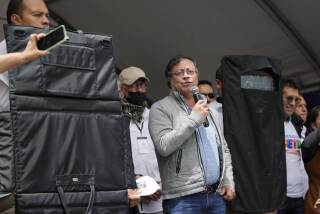Time frame set for Ahmadinejad’s inaugural
- Share via
TEHRAN — Iran’s constitutional watchdog received approval Tuesday to extend its examination of President Mahmoud Ahmadinejad’s disputed reelection victory beyond today’s deadline to Monday, state television reported.
Ayatollah Ahmad Jannati, the chief of the Guardian Council, which is overseeing the probe into allegations of vote fraud, said his powerful 12-member body needed more time for “the purpose of greater meticulousness and overcoming any possible ambiguity,” according to a statement read on state television.
Earlier Tuesday, the council declared that it had found no evidence of “major” election irregularities and ruled out nullifying Ahmadinejad’s disputed victory.
Analysts cautioned against reading too much into the Guardian Council’s decision to extend the deadline for its review. Jannati is close to both Ahmadinejad and Iran’s supreme leader, Ayatollah Ali Khamenei, and the announcement may be a tactical measure aimed at cooling the tempers of Ahmadinejad’s main election challenger, Mir-Hossein Mousavi, and his supporters, who have become less vocal in recent days.
The announcement could have also been meant to detract from the call by former parliament Speaker Mehdi Karroubi, a reformist who trailed both Ahmadinejad and Mousavi in official election results, for a national day of mourning Thursday to honor those killed in recent clashes between demonstrators and security forces.
The decision came even as parliament announced that Ahmadinejad will be sworn in for a second term by mid-August.
Tehran’s streets, stricken with demonstrations and riots since the election, were noticeably quiet Tuesday, with security forces arrayed at key squares and intersections and no reports of violence. Pro-government Basiji militiamen, some wearing camouflage and armed with truncheons and others in plainclothes, lined the roadway leading to Enghelab (Revolution) Square.
Along boulevards that had been scenes of rioting, middle-aged militiamen licked ice cream, sipped fruit juice and stretched their legs in the summer heat.
Iran witnessed its worst domestic unrest since the 1979 Islamic Revolution after demonstrators poured out into the streets to protest what they described as massive vote fraud in Ahmadinejad’s reelection.
After days of mass protests, Khamenei on Friday ordered people off the streets and sided explicitly with Ahmadinejad, a move that left the opposition scrambling for a strategy. A violent crackdown ensued Saturday as police and militiamen forced demonstrators off the streets with clubs.
Diplomatic consequences of the vote and subsequent violence continued to unfold Tuesday, potentially affecting President Obama’s plan to engage Iran as a way of halting its pursuit of sensitive nuclear technology.
Iran recalled its ambassador to Britain in a further souring of diplomatic relations between Tehran and London, which is among the international players pushing for a settlement of the ongoing dispute over the Islamic Republic’s nuclear research program. Iran accuses Britain of launching a Persian-language version of BBC programming aimed at an Iranian audience before the election to sow discontent and undermine Iran’s stability.
In London, the government announced that it was expelling two Iranian diplomats in response to Tehran’s order Monday for a pair of British diplomats to leave. Prime Minister Gordon Brown said that Iran’s action was unjustified, and that its allegations of British support for the Iranian opposition were “absolutely without foundation.”
Tehran also accused United Nations Secretary-General Ban Ki-moon of meddling in Iranian affairs after he called on the Islamic Republic to respect human rights. The U.N. Security Council has passed resolutions condemning Iran’s production of enriched uranium, which can be used to build a bomb or provide fuel for a civilian power reactor. The U.N.’s arms control watchdog regularly conducts inspections of Iran’s nuclear program.
“Mr. Ban Ki-moon, under the influence of some powers, is ignoring the realities of Iran’s election and his remarks are clearly contradicting his duties . . . and are a clear interference in Iran’s state matters,” Foreign Ministry spokesman Hassan Qashqavi said, according to the Iranian Students News Agency.
The conservative Iranian media have been savaging Mousavi, Karroubi and other reformists. The hard-line newspaper Iran, controlled by Ahmadinejad’s camp, said Mousavi’s recent comments showed he is “engulfed in a thick shield of personality cult, and is seeing himself as a savior, who is licensed to cross the boundaries of lawlessness, and inflict the biggest damage on the Islamic Revolution.”
A crackdown on media and dissidents continued. A top official at the Islamic Culture and Guidance Ministry confirmed the arrest of Iason Athanasiadis, a Greek-born journalist working for the Washington Times. Mohsen Moqadaszadeh, the official, told the Fars news agency that he did not know why Athanasiadis was arrested.
“If they act against the national security of our country and are involved in espionage work, they will be arrested by the intelligence agents and will be handed over to the judiciary officials,” he said, according to Fars.
--
Mostaghim is a special correspondent. Times staff writers Borzou Daragahi in Tehran and Henry Chu in London contributed to this report.
More to Read
Sign up for Essential California
The most important California stories and recommendations in your inbox every morning.
You may occasionally receive promotional content from the Los Angeles Times.













